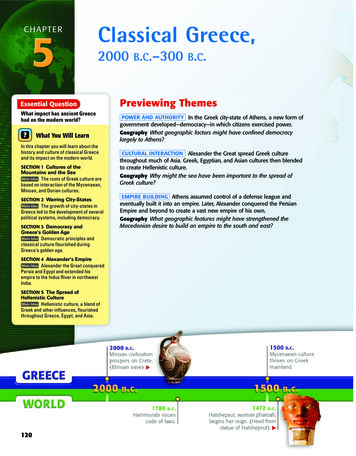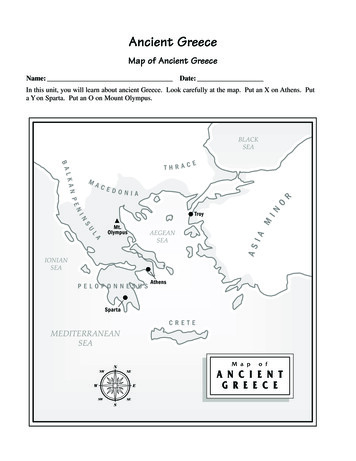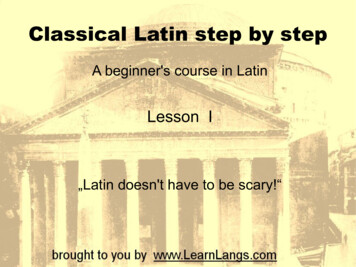
Transcription
CHAPTER5Classical Greece,2000 B.C.–300 B.C.Essential QuestionWhat impact has ancient Greecehad on the modern world?What You Will LearnIn this chapter you will learn about thehistory and culture of classical Greeceand its impact on the modern world.SECTION 1 Cultures of theMountains and the SeaThe roots of Greek culture arebased on interaction of the Mycenaean,Minoan, and Dorian cultures.SECTION 2 Warring City-StatesThe growth of city-states inGreece led to the development of severalpolitical systems, including democracy.SECTION 3 Democracy andGreece's Golden AgeDemocratic principles andclassical culture flourished duringGreece's golden age.SECTION 4 Alexander's EmpireAlexander the Great conqueredPersia and Egypt and extended hisempire to the Indus River in northwestIndia.SECTION 5 The Spread ofHellenistic CultureHellenistic culture, a blend ofGreek and other influences, flourishedthroughout Greece, Egypt, and Asia.120Previewing ThemesPOWER AND AUTHORITY In the Greek city-state of Athens, a new form ofgovernment developed—democracy—in which citizens exercised power.Geography What geographic factors might have confined democracylargely to Athens?CULTURAL INTERACTION Alexander the Great spread Greek culturethroughout much of Asia. Greek, Egyptian, and Asian cultures then blendedto create Hellenistic culture.Geography Why might the sea have been important to the spread ofGreek culture?EMPIRE BUILDING Athens assumed control of a defense league andeventually built it into an empire. Later, Alexander conquered the PersianEmpire and beyond to create a vast new empire of his own.Geography What geographic features might have strengthened theMacedonian desire to build an empire to the south and east?
Delphi121
What does this art tellyou about Greek culture?When you think of ancient Greece, what is the first thing thatcomes to mind? You can learn a lot about a culture from itsworks of art and literature, as well as from the statements of itsleaders, philosophers, and historians. Look at these Greekworks of art and read the quotations.“As an oak tree falls on the hillsidecrushing all that lies beneath, soTheseus. He presses out the life, thebrute’s savage life, and now it liesdead.”Edith Hamilton, “Theseus,” Mythology This plate shows Theseus, thegreatest hero of Athens, killing themythological beast the Minotaur. This stone relief panel ofDemocracy crowning Athens wasplaced in the marketplace, wherecitizens could see it daily.“Our constitution is called ademocracy because power is inthe hands not of a minority butof the whole people.” The Greeks often adornedtheir public buildings withgraceful sculptures of godsand goddesses.Pericles, an Athenian statesman“For we are lovers ofthe beautiful in our tastes.”Thucydides, a historianEXAM I N I NGtheISSU ES What does the relief panel suggest about the role ofdemocracy in Greek society? Why might the Greeks decorate pottery with a heroic scene? Why might the Greeks place graceful statues in and aroundtheir public buildings?122 Chapter 5Break into small groups and discuss what these artworks suggestabout ancient Greek culture. Also discuss what the quotations tellyou about the culture and its ideals. As you read about ancientGreece, think about how its culture influenced later civilizations.
1Cultures of theMountains and the SeaMAIN IDEACULTURAL INTERACTION Theroots of Greek culture are basedon interaction of the Mycenaean,Minoan, and Dorian cultures.WHY IT MATTERS NOWThe seeds of much of Westerncultural heritage were plantedduring this time period.TERMS & NAMES Mycenaean Trojan War Dorian Homer epic mythSETTING THE STAGE In ancient times, Greece was not a united country.It was a collection of separate lands where Greek-speaking people lived. By3000-B.C., the Minoans lived on the large Greek island of Crete. The Minoanscreated an elegant civilization that had great power in the Mediterranean world.At the same time, people from the plains along the Black Sea and Anatoliamigrated and settled in mainland Greece.Geography Shapes Greek LifeAncient Greece consisted mainly of a mountainous peninsula jutting out intothe Mediterranean Sea. It also included about 2,000 islands in the Aegean(ih JEE uhn) and Ionian (eye OH nee uhn) seas. Lands on the eastern edge ofthe Aegean were also part of ancient Greece. (See the map on page 121.) Theregion’s physical geography directly shaped Greek traditions and customs.TAKING NOTESUse the graphic organizeronline to take noteson the roots of Greekculture.The Sea The sea shaped Greek civilization just as rivers shaped the ancientcivilizations of Egypt, the Fertile Crescent, India, and China. In one sense, theGreeks did not live on a land but around a sea. Greeks rarely had to travel morethan 85 miles to reach the coastline. The Aegean Sea, the Ionian Sea, and theneighboring Black Sea were important transportation routes for the Greek people. These seaways linked most parts of Greece. As the Greeks became skilledsailors, sea travel connected Greece with other societies. Sea travel and tradewere also important because Greece lacked natural resources, such as timber,precious metals, and usable farmland.The Land Rugged mountains covered about three-fourths of ancient Greece.The mountain chains ran mainly from northwest to southeast along the BalkanPeninsula. Mountains divided the land into a number of different regions. Thissignificantly influenced Greek political life. Instead of a single government, theGreeks developed small, independent communities within each little valley and itssurrounding mountains. Most Greeks gave their loyalty to these local communities.In ancient times, the uneven terrain also made land transportation difficult.Of the few roads that existed, most were little more than dirt paths. It often tooktravelers several days to complete a journey that might take a few hours today.Much of the land itself was stony, and only a small part of it was arable, orsuitable for farming. Tiny but fertile valleys covered about one-fourth of Greece.Classical Greece 123
The small streams that watered these valleys were not suitable for large-scaleirrigation projects. With so little fertile farmland or fresh water for irrigation,Greece was never able to support a large population. Historians estimate that nomore than a few million people lived in ancient Greece at any given time. Even thissmall population could not expect the land to support a life of luxury. A desire formore living space, grassland for raising livestock, and adequate farmland may havebeen factors that motivated the Greeks to seek new sites for colonies.The Climate Climate was the third important environmental influence on Greekcivilization. Greece has a varied climate, with temperatures averaging 48 degreesFahrenheit in the winter and 80 degrees Fahrenheit in the summer. In ancient times,these moderate temperatures supported an outdoor life for many Greek citizens.Men spent much of their leisure time at outdoor public events. They met often todiscuss public issues, exchange news, and take an active part in civic life.Analyzing CausesIn what waysdid Greece’s location by the sea andits mountainousland affect itsdevelopment?Mycenaean Civilization DevelopsAs Chapter 3 explained, a large wave of Indo-Europeans migrated from theEurasian steppes to Europe, India, and Southwest Asia. Some of the people whosettled on the Greek mainland around 2000 B.C. were later known as Mycenaeans.The name came from their leading city, Mycenae (my SEE nee).Mycenae was located in southern Greece on a steep, rocky ridge and surroundedby a protective wall more than 20 feet thick. The fortified city of Mycenae couldwithstand almost any attack. From Mycenae, a warrior-king ruled the surroundingvillages and farms. Strong rulers controlled the areas around other Mycenaeancities, such as Tiryns and Athens. These kings dominated Greece from about 1600to 1100 B.C.Black Sea42 NMycenaean Greece, c. 1250 B.C.Mycenaean GreeceMycenaean cityOther cityTrade uboeaAthensVIDEOChiosSamosTirynsGreece: TheTrojansMiletusPeloponnesusPylosRhodes16 ECreteGEOGRAPHY SKILLBUILDER:Interpreting Maps1. Location Where was the center of theMycenaean Civilization located?2. Movement Based on the map, howdid Mycenaean traders conduct mostof their trade?34 NCyprusKnossosMediterraneanSea024 E0100 Miles200 Kilometers32 EEGYPT124
Contact with Minoans Sometime afterRecognizingEffectsHow didcontact with theMinoans affectMycenaean culture?1500 B.C., through either trade or war, theMycenaeans came into contact with theMinoan civilization. From their contactwith the Minoans, the Mycenaeans sawthe value of seaborne trade. Mycenaeantraders soon sailed throughout the easternMediterranean, making stops at Aegeanislands, coastal towns in Anatolia, andports in Syria, Egypt, Italy, and Crete.The Minoans also influenced theMycenaeans in other ways. The Mycenaeans adapted the Minoan writing system to the Greek language and decoratedvases with Minoan designs. The Minoaninfluenced culture of Mycenae formed thecore of Greek religious practice, art,politics, and literature. Indeed, Westerncivilization has its roots in these twoearly Mediterranean civilizations.The Trojan War During the 1200s B.C.,the Mycenaeans fought a ten-year war against Troy, an independent trading citylocated in Anatolia. According to legend, a Greek army besieged and destroyedTroy because a Trojan prince had kidnapped Helen, the beautiful wife of aGreek king.For many years, historians thought that the legendary stories told of the TrojanWar were totally fictional. However, excavations conducted in northwesternTurkey during the 1870s by German archaeologist Heinrich Schliemann suggested that the stories of the Trojan War might have been based on real cities,people, and events. Further archaeological studies conducted in the 20th centurysupport Schliemann’s findings. Although the exact nature of the Trojan Warremains unclear, this attack on Troy was almost certainly one of the last Mycenaeanbattle campaigns.Greek storiestell of their army’scapture of the legendary city of Troyby hiding soldiersin a hollowwooden horse. Greek Culture Declines Under the DoriansNot long after the Trojan War, Mycenaean civilization collapsed. Around 1200 B.C.,sea raiders attacked and burned many Mycenaean cities. According to tradition,a new group of people, the Dorians (DAWR ee uhnz), moved into the war-torncountryside. The Dorians spoke a dialect of Greek and may have been distantrelatives of the Bronze Age Greeks.The Dorians were far less advanced than the Mycenaeans. The economycollapsed and trade eventually came to a standstill soon after their arrival. Mostimportant to historians, Greeks appear to have temporarily lost the art of writingduring the Dorian Age. No written record exists from the 400-year period between1150 and 750 B.C. As a result, little is known about this period of Greek history.Epics of Homer Lacking writing, the Greeks of this time learned about theirhistory through the spoken word. According to tradition, the greatest storytellerwas a blind man named Homer. Little is known of his personal life. Some historiansbelieve that Homer composed his epics, narrative poems celebrating heroic deeds,sometime between 750 and 700-B.C. The Trojan War forms the backdrop for one ofHomer’s great epic poems, the Iliad.Classical Greece 125
The heroes of the Iliad are warriors: the fierce Greek Achilles(uh KIHL eez) and the courageous and noble Hector of Troy. In thefollowing dramatic excerpt, Hector’s wife begs him not to fight Achilles:PRIMARY SOURCE“My dear husband, your warlike spirit will be your death. You've nocompassion for your infant child, for me, your sad wife, who before longwill be your widow. . . . As for me, it would be better, if I'm to lose you,to be buried in the ground. . . .”Great Hector . . . replied, “Wife, all this concerns me, too. But I’d bedisgraced, dreadfully shamed . . . , if I should slink away from war, like acoward. [F]or I have learned always to be brave, to fight alongside Trojansat the front, striving to win great fame for my father, for myself.”HOMER, the Iliad (translated by Ian Johnston)Hector’s response to his wife gives insight into the Greek heroicideal of aretē (ar uh TAY), meaning virtue and excellence. A Greekcould display this ideal on the battlefield in combat or in athleticcontests on the playing field.Greeks Create Myths The Greeks developed a rich set of myths, or traditionalstories, about their gods. The works of Homer and another epic, Theogony byHesiod, are the source of much of Greek mythology. Through the myths, the Greekssought to understand the mysteries of nature and the power of human passions.Myths explained the changing of the seasons, for example.Greeks attributed human qualities, such as love, hate, and jealousy, to theirgods. The gods quarreled and competed with each other constantly. However,unlike humans, the gods lived forever. Zeus, the ruler of the gods, lived on MountOlympus with his wife, Hera. Hera was often jealous of Zeus’ relationships withother women. Athena, goddess of wisdom, was Zeus’ daughter and his favoritechild. The Greeks thought of Athena as the guardian of cities, especially ofAthens, which was named in her honor. You will learn about Athens and othercities in Section 2.SECTION1This is amarble sculptureof Polyphemus—acyclops, or oneeyed monster—who appears inanother ofHomer’s epics,the Odyssey. ASSESSMENTTERMS & NAMES 1. For each term or name, write a sentence explaining its significance. Mycenaean Trojan War Dorian Homer epic mythUSING YOUR NOTESMAIN IDEASCRITICAL THINKING & WRITING2. Which of the cultures on your3. What impact did nearness6. DRAWING CONCLUSIONS How did the physical geographychart do you think contributedto the sea have on thethe most to Greek culture?development of Greece?Explain.4. What aspects of culture did theMycenaeans adopt from theCulture ContributionMinoans?Minoan Writing System:pottery designsMycenaeanDorian5. Why were the epics ofimportance to the Greeks ofthe Dorian period?of Greece cause Greek-speaking peoples to developseparate, isolated communities?7. ANALYZING CAUSES Other than the explanation offeredin the legend, why do you think the Greeks went to warwith Troy?8. MAKING INFERENCES The Dorian period is often calledGreece’s Dark Age. Why do you think this is so?9. WRITING ACTIVITY CULTURAL INTERACTION Write anexpository essay explaining why the Greek epics andmyths are so well known and studied in today’s society.CONNECT TO TODAY WRITING EXPLANATIONSMany names and phrases from this period of Greek history have been absorbed into theEnglish language. Use library resources to find examples, such as Achilles heel, Homeric, andTrojan horse. Write a brief explanation of each example.126 Chapter 5
2Warring City-StatesMAIN IDEAPOWER AND AUTHORITY Thegrowth of city-states in Greeceled to the development ofseveral political systems,including democracy.WHY IT MATTERS NOWMany political systems in today’sworld mirror the varied formsof government that evolved inGreece.TERMS & NAMES polisacropolismonarchyaristocracyoligarchy tyrantdemocracyhelotphalanxPersian WarsSETTI NG TH E STAGE During the Dorian period, Greek civilizationexperienced decline. However, two things changed life in Greece. First, Doriansand Mycenaeans alike began to identify less with the culture of their ancestorsand more with the local area where they lived. Second, by the end of this period,the method of governing areas had changed from tribal or clan control to moreformal governments—the city-states.Rule and Order in Greek City-StatesBy 750 B.C., the city-state, or polis, was the fundamental political unit in ancientGreece. A polis was made up of a city and its surrounding countryside, whichincluded numerous villages. Most city-states controlled between 50 and 500square miles of territory. They were often home to fewer than 10,000 residents.At the agora, or marketplace, or on a fortified hilltop called an acropolis(uh KRAHP uh lihs), citizens gathered to discuss city government.TAKING NOTESUse the graphic organizeronline to take notes onimportant events in thedevelopment of Athensand Sparta.Greek Political Structures Greek city-states had many different forms ofgovernment. (See the chart on page 128.) In some, a single person, called a king,ruled in a government called a monarchy. Others adopted an aristocracy(AR ih STAHK ruh see), a government ruled by a small group of noble,landowning families. These very rich families often gained political powerafter serving in a king’s military cavalry. Later, as trade expanded, a new classof wealthy merchants and artisans emerged in some cities. When these groupsbecame dissatisfied with aristocratic rule, they sometimes took power or sharedit with the nobility. They formed an oligarchy, a government ruled by a fewpowerful people.Tyrants Seize Power In many city-states, repeated clashes occurred betweenrulers and the common people. Powerful individuals, usually nobles or otherwealthy citizens, sometimes seized control of the government by appealing tothe common people for support. These rulers were called tyrants. Unlike today,tyrants generally were not considered harsh and cruel. Rather, they were lookedupon as leaders who would work for the interests of the ordinary people. Oncein power, for example, tyrants often set up building programs to provide jobs andhousing for their supporters.Classical Greece 127
Athens Builds a Limited DemocracyThe idea of representative government also began to take root in some city-states,particularly Athens. Like other city-states, Athens went through power strugglesbetween rich and poor. However, Athenians avoided major political upheavals bymaking timely reforms. Athenian reformers moved toward democracy, rule by thepeople. In Athens, citizens participated directly in political decision making.Building Democracy The first step toward democracy came when a noblemannamed Draco took power. In 621 B.C., Draco developed a legal code based on theidea that all Athenians, rich and poor, were equal under the law. Draco’s code dealtvery harshly with criminals, making death the punishment for practically everycrime. It also upheld such practices as debt slavery, in which debtors worked asslaves to repay their debts.More far-reaching democratic reforms were introduced by Solon (SO luhn),who came to power in 594 B.C. Stating that no citizen should own another citizen,Solon outlawed debt slavery. He organized all Athenian citizens into four socialclasses according to wealth. Only members of the top three classes could holdpolitical office. However, all citizens, regardless of class, could participate in theAthenian assembly. Solon also introduced the legal concept that any citizen couldbring charges against wrongdoers.Around 500 B.C., the Athenian leader Cleisthenes (KLYS thuh NEEZ) introducedfurther reforms. He broke up the power of the nobility by organizing citizens into tengroups based on where they lived rather than on their wealth. He also increased thepower of the assembly by allowing all citizens to submit laws for debate and passage.Cleisthenes then created the Council of Five Hundred. This body proposed laws andcounseled the assembly. Council members were chosen by lot, or at random.The reforms of Cleisthenes allowed Athenian citizens to participate in a limiteddemocracy. However, citizenship was restricted to a relatively small number ofAthenians. Only free adult male were considered citizens. Women, slaves, and foreigners were excluded from citizenship and had few rights.Athenian Education For the most part, only the sons of wealthy families receivedformal education. Schooling began around the age of seven and largely preparedboys to be good citizens. They studied reading, grammar, poetry, history, mathematics, and music. Because citizens were expected to debate issues in the assembly, boys also received training in logic and public speaking. And since the Greeksbelieved that it was important to train and develop the body, part of each dayVocabularyThe legal codeprepared by Dracowas so harsh thatthe word draconianhas come to mean“extreme cruelty orseverity.”ContrastingHow isAthenian democracy different frommodern Americandemocracy?Forms of GovernmentMonarchyAristocracy State ruled by a king State ruled by nobility Rule is hereditary Rule is hereditary andbased on family ties,social rank, wealth Some rulers claimdivine right Practiced in Mycenaeby 2000 B.C.OligarchyDirect Democracy State ruled by a smallgroup of citizens State ruled by itscitizens Rule is based on wealthor ability Rule is based oncitizenship Social status and wealthsupport rulers’ authority Ruling group controlsmilitary Majority rule decides vote Practiced in Athens priorto 594 B.C. Practiced in Sparta by 500 B.C. Practiced in Athens byabout 500 B.C.SKILLBUILDER: Interpreting Charts1. Summarizing Which forms of government feature rule based on wealth or property ownership?2. Clarifying In which form of government do citizens have the most power?128 Chapter 5
A Husband’s AdviceIn this excerpt from The Economist, the Greek historianXenophon describes how a husband might respond to hiswife’s question about how she could remain attractive:PRIMARY SOURCEI counseled her to oversee the baking womanas she made the bread; to stand beside thehousekeeper as she measured out her stores; togo on tours of inspection to see if all things werein order as they should be. For, as it seemed tome, this would at once be walking exercise andsupervision. And, as an excellent gymnastic, Irecommended her to knead the dough and roll thepaste; to shake the coverlets and make the beds;adding, if she trained herself in exercise of this sortshe would enjoy her food, grow vigorous in health,and her complexion would in very truth be lovelier.The very look and aspect of the wife.Xenophon, The Economist, Book 10 (Translated byH. G. Dakyns)DOCUMENT-BASED QUESTIONS1. Making Inferences What is the husbandsuggesting in his advice to his wife?2. Synthesizing How is the husband’sadvice representative of Athenianattitudes toward women?was spent in athletic activities. When they got older, boys went to military schoolto help them prepare for another important duty of citizenship—defending Athens.Athenian girls did not attend school. Rather, they were educated at home bytheir mothers and other female members of the household. They learned aboutchild-rearing, weaving cloth, preparing meals, managing the household, and otherskills that helped them become good wives and mothers. Some women were ableto take their education farther and learned to read and write. A few even becameaccomplished writers. Even so, most women had very little to do with Athenianlife outside the boundaries of family and home.Sparta Builds a Military StateLocated in the southern part of Greece known as the Peloponnesus(pehl uh puh NEE sus), Sparta was nearly cut off from the rest of Greece by theGulf of Corinth. (See the map on page 121.) In outlook and values, Spartacontrasted sharply with the other city-states, Athens in particular. Instead of ademocracy, Sparta built a military state.Sparta Dominates Messenians Around 725b.c.,Sparta conquered theneighboring region of Messenia and took over the land. The Messenians becamehelots (HEHL uhts), peasants forced to stay on the land they worked. Each year,the Spartans demanded half of the helots’ crops. In about 650 b.c., the Messenians,resentful of the Spartans’ harsh rule, revolted. The Spartans, who were outnumbered eight to one, just barely put down the revolt. Shocked at their vulnerability,they dedicated themselves to making Sparta a strong city-state.Classical Greece 129
VIDEOThe Temple ofArtemis atEphesusFestivals and SportsThe ancient Greeks believed that strong healthy citizens helped strengthenthe city-state. They often included sporting events in the festivals they heldto honor their gods. The most famous sports festival was the Olympicgames, held every four years. Records of Olympics winners started in776 b.c. At first, the festival lasted only one day and had only one contest,a race called the stade. Later, many other events were added, includinga long-distance race, wrestling, the long jump, the javelin, and the discusthrow. The Olympics was expanded to five days in 472 b.c. Women’s Sports Women had their own sports festival inancient Greece. It was the festival devotedto Hera, the wife of Zeus. Like the Olympics,the Hera festival was held every four years.One of the main events was a foot racefor unmarried women.Discus ThrowerAncient athletes, such as this discus thrower,would be considered amateurs today becausethey received no pay for competing. However, theytrained rigorously for months at a time. Victorswere given lavish gifts and were hailed as heroes.Many athletes competed full-time.Mount Olympus The ancient Olympics honored Zeus, the father ofall Greek gods and goddesses. According to legend,Zeus hurled a thunderbolt from Mount Olympus ata spot in rural Greece. An altar for Zeus was built onthat spot. Eventually, many buildings were erectedaround the altar. This area was called Olympia andbecame the site for the Olympic games.SKILLBUILDER: Interpreting Visual Sources1. Evaluating Decisions Do you think it was a good decision for theGreeks to add more sporting events to the Olympics? Explain.2. Comparing and Contrasting How are today’s Olympics similar toand different from the Olympics in ancient Greece?130 Chapter 5
Sparta’s Government and Society Spartan government had several branches. Anassembly, which was composed of all Spartan citizens, elected officials and votedon major issues. The Council of Elders, made up of 30 older citizens, proposedlaws on which the assembly voted. Five elected officials carried out the lawspassed by the assembly. These men also controlled education and prosecuted courtcases. In addition, two kings ruled over Sparta’s military forces.The Spartan social order consisted of several groups. The first were citizensdescended from the original inhabitants of the region. This group included theruling families who owned the land. A second group, noncitizens who were free,worked in commerce and industry. The helots, at the bottom of Spartan society,were little better than slaves. They worked in the fields or as house servants.Spartan Daily Life From around 600 until 371 B.C., Sparta had the most powerfulComparingHow would youcompare the idealsof Spartan andAtheniansocieties?army in Greece. However, the Spartan people paid a high price for their militarysupremacy. All forms of individual expression were discouraged. As a result,Spartans did not value the arts, literature, or other artistic and intellectual pursuits.Spartans valued duty, strength, and discipline over freedom, individuality, beauty,and learning.Since men were expected to serve in the army until the age of 60, their daily lifecentered on military training. Boys left home when they were 7 and moved intoarmy barracks, where they stayed until they reached the age of 30. They spent theirdays marching, exercising, and fighting. They undertook these activities in allweathers, wearing only light tunics and no shoes. At night, they slept withoutblankets on hard benches. Their daily diet consisted of little more than a bowl ofcoarse black porridge. Those who were not satisfied were encouraged to steal food.Such training produced tough, resourceful soldiers.Spartan girls also led hardy lives. They received some military training, and theyalso ran, wrestled, and played sports. Like boys, girls were taught to put service toSparta above everything—even love of family. A legend says that Spartan womentold husbands and sons going to war to “come back with your shield or on it.” Asadults, Spartan women had considerable freedom, especially in running the familyestates when their husbands were on active military service. Such freedom surprised men from other Greek city-states. This was particularly true of Athens,where women were expected to remain out of sight and quietly raise children.The Persian WarsDanger of a helot revolt led Sparta to become a military state. Struggles betweenrich and poor led Athens to become a democracy. The greatest danger of all—invasion by Persian armies—moved Sparta and Athens alike to their greatest glory.A New Kind of Army Emerges During the Dorian Age, only the rich could affordbronze spears, shields, breastplates, and chariots. Thus, only the rich served inarmies. Iron later replaced bronze in the manufacture of weapons. Harder thanbronze, iron was more common and therefore cheaper. Soon, ordinary citizenscould afford to arm and defend themselves. The shift from bronze to iron weaponsmade possible a new kind of army composed not only of the rich but also ofmerchants, artisans, and small landowners. The foot soldiers of this army, calledhoplites, stood side by side, each holding a spear in one hand and a shield inthe other. This fearsome formation, or phalanx (FAY LANGKS), became the mostpowerful fighting force in the ancient world.INTERACTIVEMAPFollow the keybattles of thePersian Wars.Battle at Marathon The Persian Wars, between Greece and the Persian Empire,began in Ionia on the coast of Anatolia. (See the map on page 132.) The Greekshad long been settled there, but around 546 B.C., the Persians conquered the area.Classical Greece 131
When Ionian Greeks revolted, Athens sent ships and soldiers to their aid. The Persianking Darius the Great defeated the rebels and then vowed to destroy Athens in revenge.In 490 B.C., a Persian fleet carried 25,000 men across the Aegean Sea and landednortheast of Athens on a plain called Marathon. There, 10,000 Athenians, neatlyarranged in phalanxes, waited for them. Vastly outnumbe
Macedonian desire to build an empire to the south and east? Essential Question CHAPTER5 In this chapter you will learn about the history and culture of classical Greece and its impact on the modern world. SECTION 1 Cultures of the Mountains and the Sea The roots of Greek culture are based on interaction of the Mycenaean, Minoan, and Dorian .










